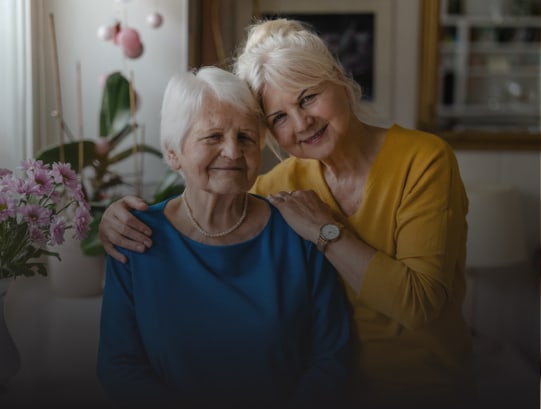Key Takeaways
- Strong relationships directly impact your physical health by lowering blood pressure and boosting your immune system
- Social connections help maintain cognitive function and provide emotional support
- Building relationships with family, friends, and community members remains important at any age
- Senior living communities create natural opportunities for meaningful connections
- Taking small steps to strengthen relationships can lead to significant improvements in your overall well-being
Why Relationships Are So Important for Seniors
The connections we build with others shape how we feel, think, and live each day. Whether it’s sharing a meal with family or finding community through shared activities, relationships play a powerful role in quality of life. They offer significant physical, emotional, and cognitive benefits to older adults in senior living.
In senior living, these moments happen naturally. Through everyday routines, thoughtful programs, and convenient common spaces, senior living communities help residents create new relationships and bond with others. These are just a few ways senior living creates environments where friendships—and residents—thrive.
How Relationships Support Your Physical Health as You Age
Your social connections aren’t just about spending happy times with others. They create measurable changes in your body that support your physical health. When you spend time with people you care about, your body responds in positive ways that can help you feel stronger and more resilient.
Lower Blood Pressure and Heart Health
Laughter, conversation, and connection help your cardiovascular system work more efficiently. These simple interactions support healthy blood pressure and reduce physical tension. In fact, regular social interaction can be as beneficial for your heart as taking a daily walk.
Stronger Immune System and Faster Recovery
People with strong social networks tend to recover from illnesses more quickly than those who spend most of their time alone. Your immune system gets a boost when you feel connected to others, which helps your body fight off common colds and other minor health challenges.
Increased Physical Activity and Mobility
Whether it’s through walking with a neighbor, dancing, or joining a fitness class, socializing often leads to more physical activity. When you have people to do things with, you’re more likely to move your body regularly. This social motivation often feels less like exercise and more like spending quality time with people you enjoy.
Mental and Emotional Benefits of Strong Social Connections
Your relationships serve as a support system for your mental and emotional health. Having people to talk to, laugh with, and share experiences with gives emotional stability.
Reduced Risk of Depression and Anxiety
Regular social interaction provides natural protection against feelings of sadness and worry. When you have people to share your thoughts and feelings with, problems often feel more manageable. The simple act of conversation can shift your perspective and remind you that you’re not facing challenges alone.
Improved Cognitive Function and Memory
Conversations and social activities give your brain regular workouts that help maintain your mental sharpness. Learning about other people’s experiences, sharing your own stories, and engaging in group activities all stimulate different parts of your brain.
Enhanced Sense of Purpose and Meaning
Strong relationships reinforce your role in others’ lives. Whether you’re giving advice, spending time with family, or simply listening, those moments bring meaning and connection to each day. This can be an invaluable way to preserve a sense of purpose.
Strengthening Relationships with Family Members
Family relationships often change as you age. Adult children may begin seeing you as a friend and an advisor, which creates space for mutual respect and shared understandings. If someone comes to you for advice, you can share your experience about marriage, parenting, work, and more. This helps strengthen your bond with your loved ones.
At the same time, creating new family traditions helps maintain a sense of closeness. Smaller gatherings, regular calls, or shared hobbies can become just as meaningful as past traditions. These fresh experiences blend old memories with new ones, keeping relationships active and rewarding. By embracing changes in family roles—whether from host to guest or caregiver to advisor—your bond can grow in thoughtful, lasting ways.

Maintaining Friendships & Creating New Social Connections
Your friendships provide a different kind of support than family relationships. These connections are often built on shared interests or similar life experiences. Staying connected with longtime friends adds comfort and familiarity to your routine, while reaching out to old acquaintances can lead to renewed connections that feel natural and welcome.
At the same time, hobbies and community activities can lead to new friendships that form easily through shared interests. Whether it’s reading, gardening, or joining a local group, these spaces make it easier to connect with others in a way that feels relaxed and meaningful. Together, these relationships bring warmth, variety, and a strong sense of belonging to everyday life.
How Senior Living Communities Foster Meaningful Relationships
Senior living communities create natural environments for building and maintaining relationships by bringing together people who are at similar life stages. These communities are built to make social connections easy and comfortable. They also remove many barriers that make meeting new people more of a challenge.
To do so, senior living communities offer:
- Daily activity programs tailored to a wide range of interests
- Shared meals in welcoming dining spaces
- Small group classes and clubs for hobbies and socializing
- Comfortable common areas for casual conversations
- Visitor-friendly spaces that support time with loved ones
- Events and gatherings that bring neighbors together
- Supportive staff who encourage participation without pressure
The structured—yet flexible—social opportunities help residents build friendships at their own pace.
Is It Time to Consider a Move to Senior Living?
Here at Somerby St. Vincent’s One Nineteen, we always want to help residents strengthen their connections, because that’s an important part of living the life you deserve. That’s why we go above and beyond to create natural opportunities where residents can connect. With a range of activities, events, and social spaces, connection is easier than ever in our community.
If you’re considering senior living for yourself or a loved one, our incredible team can help. Here, you’ll always have access to convenient amenities and beautiful living areas, because it’s what you deserve. Book a tour with us today to see for yourself!











